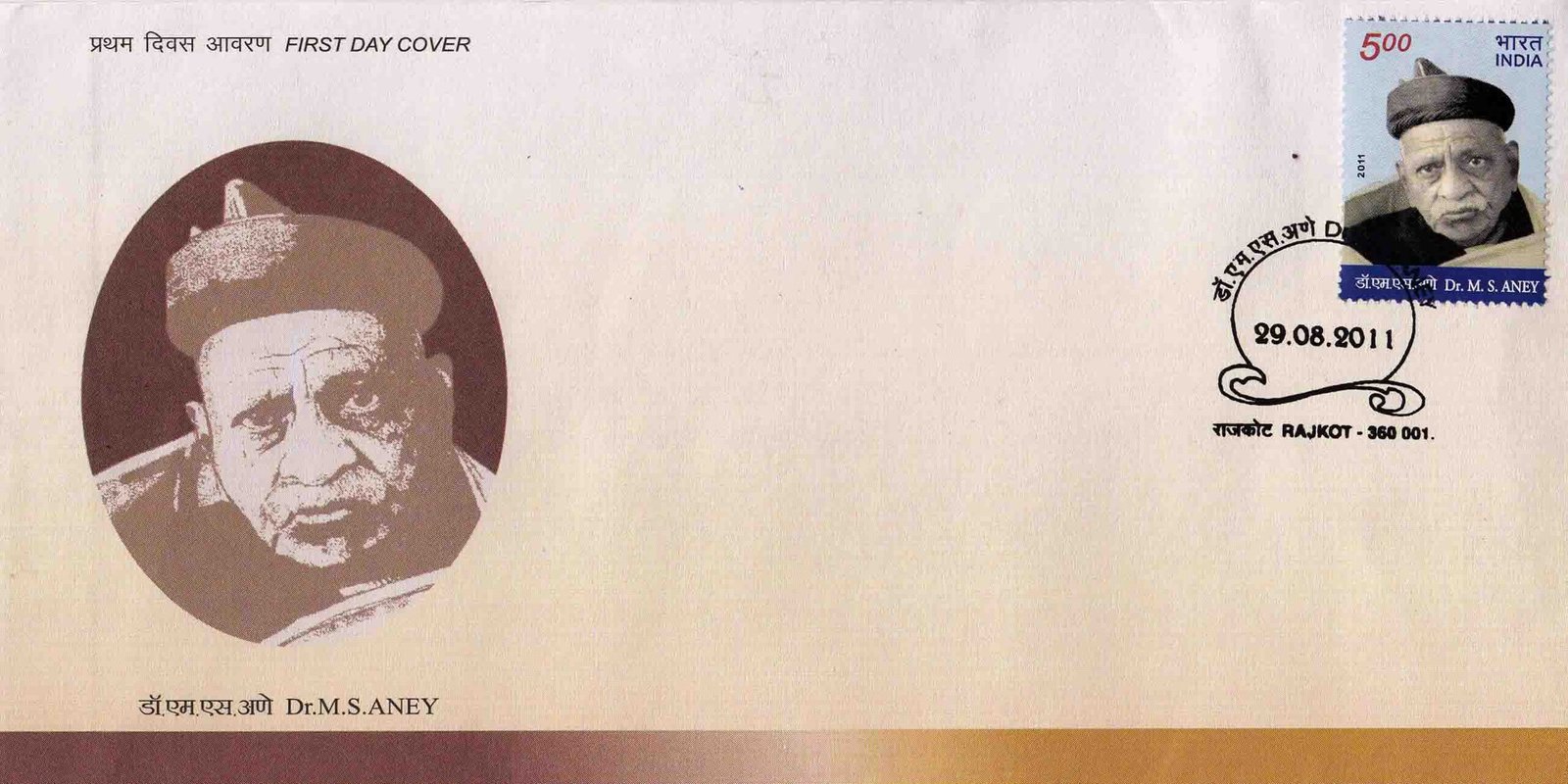Dr. Madhav Shrihari Aney

Technical Data
| Date of Issue | August 29, 2011 |
|---|---|
| Denomination | Rs. 5 |
| Quantity | 300,000 |
| Perforation | 13 |
| Printer | India Security Press, Nashik |
| Printing Process | Wet Offset |
| Watermark | No Watermark |
| Colors | Multicolor |
| Credit (Designed By) | Smt. Alka Sharma |
| Catalog Codes |
Michel IN 2613 Stanley Gibbons IN 2830 WADP Numbering System - WNS IN037.2011 |
| Themes | Anniversaries and Jubilees | Commemoration | Famous people | Headgear | Men | Politicians |
Freedom Fighter, Scholar, Statesman and Champion of Vidarbha
Early Life and Roots in Vidarbha
Dr. Madhav Srihari Aney, popularly known as Loknayak Bapuji Aney, was born on 29 August 1880 in Wani, a rural town in Yavatmal district, Maharashtra. The region, part of the former Berar Province, lay in the plains of Central India, marked by harsh summers and windswept fields of cotton, jowar, and wheat. These surroundings shaped Aney’s resilience and deep connection with the people of Vidarbha.
Influence of Lokmanya Tilak
A defining moment in Aney’s life came in 1902, when he met Lokmanya Bal Gangadhar Tilak at Morris College, Nagpur. Tilak’s nationalist ideology profoundly influenced the young Aney and decisively shaped his political and intellectual journey.
From Lawyer to Nationalist Leader
By 1910, Aney had begun practicing law at the Yavatmal court, but his transformation from lawyer to nationalist leader was already underway. His strong anti-British writings in the journal ‘Harikishor’ attracted colonial prosecution, leading to the suspension of his Sanad (license to practice law) for one year. During this period, he travelled extensively with Lokmanya Tilak on his Vidarbha campaigns, further strengthening his nationalist resolve.
Role in the Freedom Movement
In 1918, Bapuji Aney joined the Home Rule League. His rise within the Congress was swift:
- President, Vidarbha Pradesh Congress Committee (1921)
- Member, Legislative Assembly (1923)
- Member, Congress Committee (1924)
As a mass leader during the Civil Disobedience Movement, he again faced punitive action, including the cancellation of his Sanad to practice law.
Scholar, Educationist and Man of Letters
An erudite scholar, Aney made significant contributions to literature and education. In 1928, he established the Vidarbha Sahitya Sangh Sammelan at Gwalior, promoting regional literary culture. In 1938, he was appointed Vice-Chancellor of Tilak Maharashtra Vidyapeeth, Pune.
He also served as Secretary of the Nehru Committee (1928–29), contributing to early constitutional thinking for India.
Jungle Satyagraha and the Title “Loknayak”
Inspired by Mahatma Gandhi’s Salt Satyagraha, Aney resigned from the Legislative Assembly and plunged fully into the freedom struggle. His leadership of the Jungle Satyagraha, launched at Pusad in July 1930, became a landmark non-cooperation movement. He courted arrest and endured six months of imprisonment, after which he earned the title “Loknayak” (Leader of the People).
National Leadership and High Office
Aney’s stature continued to rise:
- Member, Congress Working Committee (1931)
- President, Indian National Congress (1933)
In 1941, he was appointed to the Viceroy’s Council, but resigned in 1942 in protest when the Viceroy failed to respond to Mahatma Gandhi’s fast unto death.
From 1943 to 1947, he served as India’s High Commissioner to Ceylon (Sri Lanka).
Constitution Maker and Governor
In 1948, Loknayak Aney became a Member of the Constituent Assembly, representing the Princes of Central India, and contributed to framing the Constitution of India. The same year, he was appointed Governor of Bihar, a position he held with distinction.
Champion of Vidarbha Statehood
Despite being bedridden due to serious illness between 1954 and 1960, Aney appeared before the States Reorganisation Commission (Justice Fazal Ali Commission) and forcefully argued for separate statehood for Vidarbha. Though the Commission recommended it, Vidarbha was ultimately merged into the then State of Bombay.
Parliamentary Career
In 1959, Loknayak Aney was elected to Parliament from Nagpur and served as a Member of the Lok Sabha until 1966, continuing to champion regional and national causes.
Literary Legacy and Honours
Aney founded the Marathi newspaper “Lokmat”, which has since grown into one of Maharashtra’s leading newspaper groups. His epic Sanskrit poem “Tilak Yashmov”, celebrating the life of Lokmanya Tilak, earned him the Sahitya Akademi Award, posthumously.
On the day of his death, 26 January 1968, he was honoured with India’s second-highest civilian award, the Padma Vibhushan.
Commemorative Postage Stamp
In tribute to a life devoted to India’s freedom, constitutional development, literature, and the cause of Vidarbha, India Post is honoured to issue a Commemorative Postage Stamp on Dr. M. S. Aney, celebrating the enduring legacy of a true Loknayak.
First Day Cover


Leave a Comment
You must be logged in to post a comment.